Developing a VPN app is a strategic move in today’s digital age.
With the increasing demand for secure and anonymous browsing, VPN apps have become essential for both individuals and businesses.
If you’re considering developing a VPN app, it’s crucial to understand the costs involved.
On average, the cost to develop a VPN app ranges from $50,000 to $150,000. The cost can vary depending on the app’s features, complexity, and the development team’s expertise.
In this blog, we’ll break down the factors that influence the cost of developing a VPN app and provide a detailed guide to help you navigate the process.
What is a VPN App?
The Virtual Private Network (VPN) app is a software application that allows users to create a secure and encrypted connection over a less secure network, such as the internet.
Essentially, a VPN app masks the user’s IP address, making their online actions virtually untraceable.
This is achieved by routing the user’s internet connection through a secure server in another location, thereby hiding their true location and encrypting their data.
VPN apps are crucial for maintaining privacy, especially when using public Wi-Fi networks, where the risk of data breaches is higher.
These apps not only ensure that sensitive information, such as passwords and personal data, remains protected but also allow users to bypass geographic restrictions and access content that may be blocked in certain regions.
VPN apps are used by businesses to allow employees to securely access corporate networks remotely.
By using a VPN app, all data transmitted between the user and the network is encrypted, reducing the risk of unauthorized access.
As more users become aware of the importance of online privacy and security, the demand for VPN apps continues to grow, making it a lucrative area for app development.
The Growing Market for VPN Apps
Demand for VPN apps has surged in recent years, driven by increasing concerns over online privacy, data security, and the rise of remote work.
As users become more aware of the risks associated with unsecured internet connections, the market for VPN apps continues to expand at an impressive rate.
Here’s a look at some of the latest mobile app statistics that highlight the growth and potential of the VPN market:
- Global VPN Market Size: The global VPN market was valued at $35.4 billion in 2020 and is projected to reach $107.6 billion by 2027, growing at a compound annual growth rate (CAGR) of 16.9% during the forecast period.
- Increased Usage: In 2023, it was reported that 31% of internet users worldwide have used a VPN service, marking a significant increase from previous years as more users seek to protect their online privacy.
- Mobile VPN Growth: The mobile VPN segment is expected to grow at the fastest rate, with an estimated CAGR of 19.8% from 2021 to 2028, reflecting the increasing reliance on smartphones for internet access and the need for secure connections on mobile devices.
- Adoption by Businesses: 60% of companies now use VPNs as part of their cybersecurity strategy, driven by the rise of remote work and the need to secure employee access to corporate networks.
- Regional Insights: The Asia-Pacific region is anticipated to be the fastest-growing market for VPN services, with countries like China and India seeing rapid adoption due to increased internet censorship and concerns over data privacy.
- Consumer Demand: A 2023 survey found that 80% of VPN users consider privacy and security as the main reasons for using a VPN, highlighting the ongoing consumer demand for secure internet access.
The growth of the VPN market presents a lucrative opportunity for developers and businesses looking to enter this space. By offering a reliable and feature-rich VPN app, you can capitalize on this growing demand and establish a strong presence in the market.
VPN App Essential Features
Developing a robust VPN app requires a comprehensive set of features to ensure user satisfaction, security, and seamless functionality.
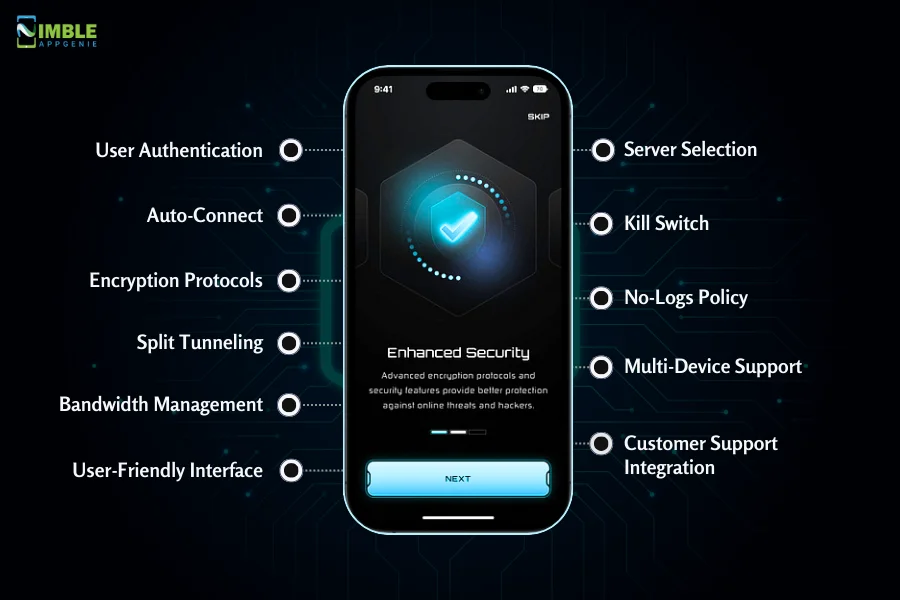
Below are the essential features that should be included in the VPN app:
-
User Authentication
A secure user authentication system is critical to protecting user data and preventing unauthorized access.
This feature typically includes options for email and password login, two-factor authentication (2FA), and biometric login (fingerprint or facial recognition) to enhance security.
-
Server Selection
Users should have the ability to choose from a list of servers located in various countries.
This feature allows users to select a server based on their needs, such as accessing region-specific content or improving connection speeds.
The app should also provide information about server load and latency to help users make informed decisions.
-
Auto-Connect
Auto-connect ensures that the VPN automatically connects when the user’s device connects to an untrusted network, such as public Wi-Fi.
This feature is essential for maintaining security without requiring the user to manually activate the VPN each time.
-
Kill Switch
A kill switch is a vital security feature that automatically disconnects the user from the internet if the VPN connection drops.
This prevents any data from being transmitted over an unsecured connection, protecting the user’s privacy at all times.
-
Encryption Protocols
The app should support multiple encryption protocols, such as OpenVPN, IKEv2/IPSec, and WireGuard.
These protocols ensure that user data is encrypted and transmitted securely, preventing unauthorized access and data breaches.
-
No-Logs Policy
To build trust with users, the VPN app must have a strict no-logs policy, meaning that it does not store any data about user activity.
This feature is crucial for ensuring user privacy and can be a significant selling point for the app.
-
Split Tunneling
Split tunneling allows users to choose which apps or websites use the VPN connection and which ones can bypass it.
This feature is particularly useful for optimizing speed and managing bandwidth, as users can prioritize traffic through the VPN while allowing other activities to use a direct connection.
-
Multi-Device Support
The VPN app should be compatible with various devices, including smartphones, tablets, laptops, and desktops.
Additionally, the app should allow users to connect to multiple devices simultaneously under a single account, providing flexibility and convenience.
-
Bandwidth Management
Bandwidth management features help users monitor and control their data usage.
This is particularly important for users with limited data plans, as it allows them to optimize their VPN usage without exceeding their data limits.
-
Customer Support Integration
Offering 24/7 customer support within the app is essential for assisting users with any issues they may encounter.
This feature can include live chat, email support, and a comprehensive FAQ section to ensure users receive timely help.
-
User-Friendly Interface
A well-designed, intuitive user interface is key to ensuring that users can easily navigate the app and access its features.
The design should prioritize simplicity and clarity, with easy-to-understand icons, buttons, and menus that enhance the overall user experience.
Why Develop a VPN App?
The growing concern over online privacy and security has led to a significant increase in the demand for VPN apps.
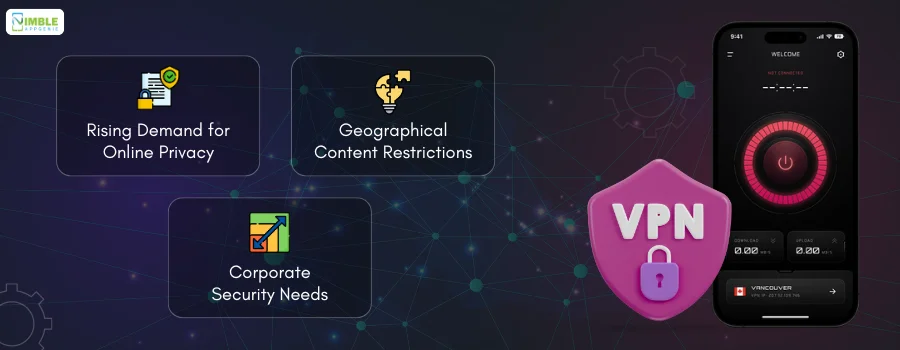
Developing a VPN app can be a highly profitable venture for several compelling reasons:
► Rising Demand for Online Privacy
In an era where data breaches and cyber-attacks are becoming more frequent, users are increasingly aware of the need to protect their online privacy.
VPN apps provide a secure and anonymous way to browse the internet, making them an essential tool for anyone concerned about their digital footprint.
As more users prioritize their online privacy, the market for VPN apps continues to expand, offering a lucrative opportunity for developers.
► Geographical Content Restrictions
Many users turn to VPN apps to bypass geographical content restrictions and access services that may be blocked in their region.
Whether it’s streaming platforms, social media sites, or restricted websites, a VPN app allows users to unlock content from around the world.
This feature is particularly attractive in regions with heavy internet censorship, where access to global content is limited.
By offering a reliable and secure VPN service, developers can tap into a large and diverse user base seeking unrestricted internet access.
► Corporate Security Needs
With the rise of remote work, companies are increasingly relying on VPNs to secure their internal networks and ensure that employees can safely access corporate resources from anywhere.
A well-developed VPN app can cater to businesses of all sizes, providing them with the tools they need to protect sensitive data and maintain productivity.
This opens up an additional revenue stream for developers, as businesses are often willing to pay a premium for reliable and secure VPN solutions.
Average Cost To Develop VPN App
So, how much does it cost to develop a VPN app?
With the rising demand for VPN apps across the world, a lot of investors, startups, and established enterprises alike are asking this question.
On average, the cost to develop a VPN app ranges from $50,000 to $150,000.
App development cost depends on a lot of different factors ranging from complexity, features, to location of developers, and their expertise.
For a better understanding of the same, it’s highly recommended that you consult a reputed development firm.
Factors That Affect Cost to Develop a VPN App
The cost of developing a VPN app can vary significantly based on a variety of factors.
Each of these factors can impact the overall budget and timeline of the project. Below is an in-depth analysis of the key factors that influence the development cost, along with cost estimates and how each factor relates to the VPN app development process.
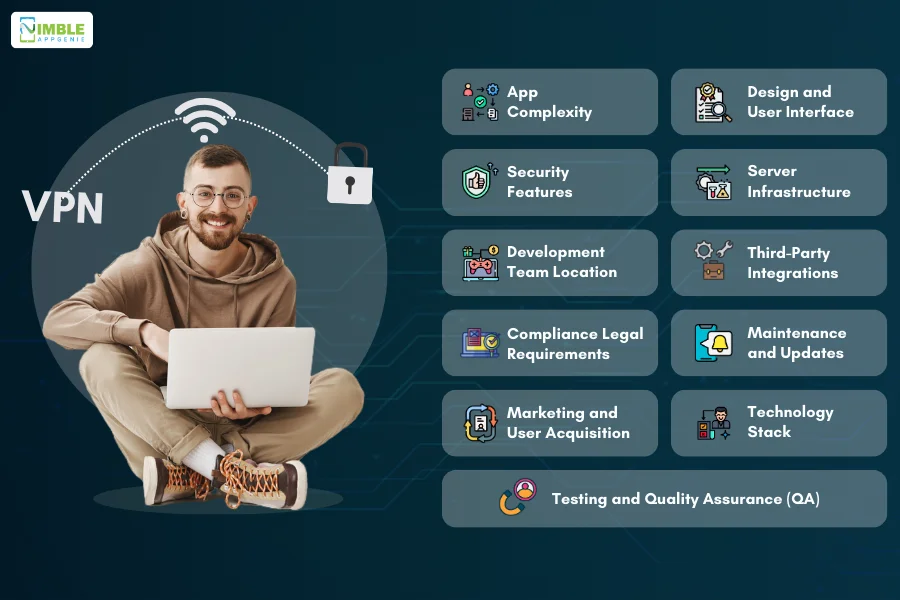
1. App Complexity
The complexity of your VPN app is one of the primary determinants of development cost.
The more advanced and feature-rich the app, the higher the cost.
For instance, a basic VPN app with essential functions like server selection and user authentication will be much cheaper to develop than a fully-featured app with capabilities such as split tunneling, kill switch, and multi-device support.
| Complexity Level | Cost Estimate |
| Basic (Essential Features Only) | $30,000 – $50,000 |
| Moderate (Advanced Features) | $50,000 – $100,000 |
| Complex (Full-Featured App) | $100,000 – $150,000 |
2. Design and User Interface (UI/UX)
Mobile app design is crucial element that determines user engagement and satisfaction.
A well-designed, intuitive interface with custom animations, seamless transitions, and a user-friendly layout will increase VPN app’s development time and costs.
The more sophisticated and appealing the design, the higher the investment required.
Here’s a breakdown of app design cost.
| Design Complexity | Cost Estimate |
| Basic UI Design | $5,000 – $10,000 |
| Moderate UI with Custom Elements | $10,000 – $20,000 |
| Advanced UI/UX Design | $20,000 – $30,000 |
3. Security Features
Security is the backbone of a VPN app, and implementing robust security measures is essential for gaining user trust.
Costs will vary depending on the level of security required, including encryption protocols (such as AES-256), a no-logs policy, kill switch, and additional features like DNS leak protection and custom encryption algorithms.
| Security Features | Cost Estimate |
| Basic Security (Standard Encryption) | $10,000 – $20,000 |
| Advanced Security (Multiple Protocols and No-Logs) | $20,000 – $40,000 |
| High-Level Security (Custom Encryption and Advanced Features) | $40,000 – $60,000 |
4. Server Infrastructure
Server infrastructure is a critical component of any VPN app.
The more servers you provide and the broader the geographical coverage, the higher the cost.
In addition to this, the infrastructure must be capable of handling large volumes of data traffic without compromising speed or security. This includes regular maintenance and scalability considerations.
| Server Infrastructure | Cost Estimate |
| Basic (Limited Servers/Locations) | $10,000 – $20,000 |
| Moderate (Moderate Servers/Locations) | $20,000 – $40,000 |
| Extensive (Global Coverage) | $40,000 – $80,000 |
5. Development Team Location
It’s time to hire app developers.
However, the location of these developers is a very important factor to consider here.
The geographical location of your development team significantly impacts the cost.
Developers in North America and Western Europe generally charge higher rates compared to those in Eastern Europe, Asia, or Latin America.
However, it’s important to balance cost with expertise to ensure quality.
Here’s a breakdown of cost to hire app developers.
| Team Location | Cost Estimate |
| North America/Western Europe | $100 – $250 per hour |
| Eastern Europe | $50 – $150 per hour |
| Asia/Latin America | $30 – $100 per hour |
6. Third-Party Integrations
Integrating third-party services and APIs (such as payment gateways, customer support systems, or analytics tools) can add to the overall cost to develop a VPN app.
These integrations are essential for enhancing the functionality and user experience of your VPN app, but they require additional time and resources to implement correctly.
| Third-Party Integrations | Cost Estimate |
| Basic Integrations (Payment Gateway and Analytics) | $5,000 – $10,000 |
| Moderate Integrations (Customer Support, Social Logins) | $10,000 – $20,000 |
| Extensive Integrations (Custom APIs, Advanced Features) | $20,000 – $40,000 |
7. Compliance and Legal Requirements
Depending on the region where your VPN app will operate, there may be specific compliance and legal requirements to adhere to.
This can include GDPR compliance in Europe, data retention laws, and regulations related to user privacy and data protection.
Meeting these requirements involves legal consultation and additional development efforts.
| Compliance and Legal | Cost Estimate |
| Basic Compliance (Standard Regions) | $5,000 – $10,000 |
| Moderate Compliance (Multiple Regions) | $10,000 – $20,000 |
| Extensive Compliance (Global and Specialized Regulations) | $20,000 – $40,000 |
8. Maintenance and Updates
Ongoing maintenance services are essential for the long-term success of your VPN app.
This includes fixing bugs, updating security protocols, adding new features, and ensuring compatibility with the latest operating systems.
These app maintenance cost can accumulate over time and should be factored into your budget.
| Maintenance Level | Cost Estimate (Annual) |
| Basic Maintenance | $5,000 – $10,000 |
| Moderate Maintenance (Regular Updates) | $10,000 – $20,000 |
| Extensive Maintenance (Frequent Updates, New Features) | $20,000 – $30,000 |
9. Marketing and User Acquisition
While not directly related to development, marketing your VPN app and acquiring users is an essential part of your overall budget.
This includes app store optimization (ASO), digital marketing campaigns, social media promotion, and influencer partnerships.
Effective marketing can significantly impact your app’s success and should be included in your cost estimation.
| Marketing Efforts | Cost Estimate |
| Basic Marketing (ASO, Basic Campaigns) | $5,000 – $10,000 |
| Moderate Marketing (Digital Campaigns, Social Media) | $10,000 – $30,000 |
| Extensive Marketing (Global Campaigns and Influencers) | $30,000 – $50,000 |
10. Technology Stack
The choice of technology stack used in developing your VPN app will also influence the cost.
Advanced technologies and frameworks may require specialized expertise, which can drive up VPN app development cost.
In addition to this, the need for scalability and performance optimization will also impact the cost.
| Technology Stack | Cost Estimate |
| Basic Stack (Common Technologies) | $10,000 – $20,000 |
| Moderate Stack (Advanced Technologies) | $20,000 – $40,000 |
| Advanced Stack (Custom Solutions, High Scalability) | $40,000 – $60,000 |
11. Testing and Quality Assurance (QA)
Thorough testing and quality assurance are crucial for delivering a reliable and secure VPN app.
This includes functional testing, security testing, and performance testing to ensure that the app meets all requirements and performs well under various conditions.
The more comprehensive the testing, the higher the cost.
| Testing Level | Cost Estimate |
| Basic Testing (Functional Tests) | $5,000 – $10,000 |
| Moderate Testing (Security and Performance Tests) | $10,000 – $20,000 |
| Extensive Testing (Automated and Load Tests) | $20,000 – $40,000 |
These factors provide a detailed view of the different elements that contribute to the overall cost of developing a VPN app.
Understanding these factors will help you create a comprehensive budget and ensure the successful development of your app, while also highlighting the importance of various aspects such as security, user experience, and ongoing maintenance.
VPN App Development Process
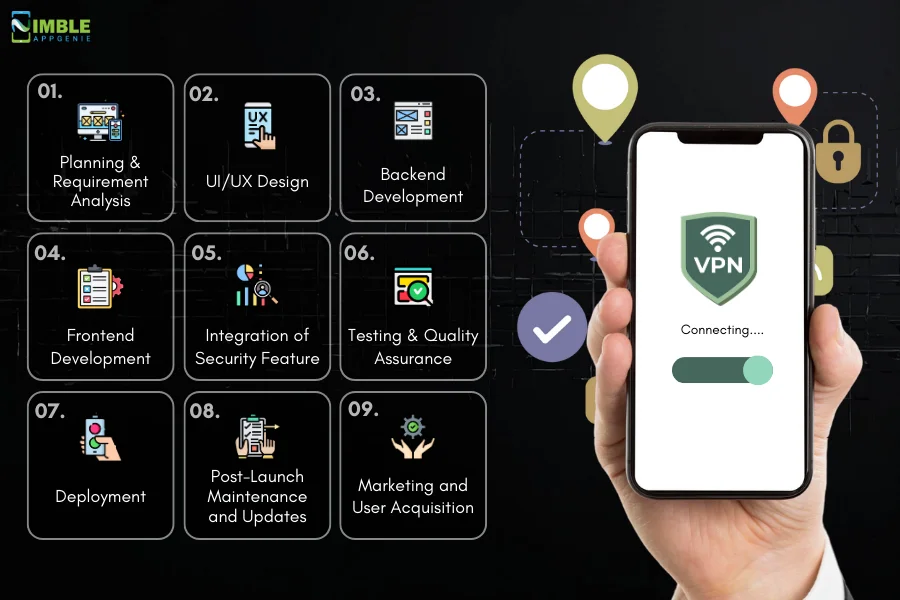
Developing a VPN app involves a structured development process that ensures all aspects of the app, from user experience to security, are meticulously planned and executed.
Below is a step-by-step guide to the VPN app development process, covering each phase from initial planning to post-launch maintenance.
Step 1: Planning and Requirement Analysis
The first step in the VPN app development process is thorough planning and requirement analysis.
This phase involves defining the app’s objectives, target audience, key features, and technology stack.
During this stage, developers and stakeholders collaborate to create a detailed project plan, including timelines, budgets, and deliverables.
- Key Activities: Market research, competitor analysis, defining user personas, setting objectives, and creating a project roadmap.
- Outcome: A clear project plan that guides the development process.
Step 2: UI/UX Design
Once the planning phase is complete, the UI/UX design team works on creating an intuitive and user-friendly interface.
The design process focuses on user experience, ensuring that the app is easy to navigate and visually appealing.
This phase includes creating wireframes, prototypes, and final design mockups.
- Key Activities: Wireframing, prototyping, UI design, user flow design.
- Outcome: A visually appealing and user-friendly design ready for development.
Step 3: Backend Development
Backend development involves setting up the server infrastructure, databases, and APIs that will power the VPN app.
This phase is crucial for ensuring the app’s security, scalability, and performance.
Developers focus on creating a robust backend that can handle user authentication, server connections, and data encryption.
- Key Activities: Setting up servers, database design, API development, implementing security protocols.
- Outcome: A secure and scalable backend architecture.
Step 4: Frontend Development
Frontend development is where the app’s user interface is brought to life.
This phase involves coding the client-side of the app, ensuring that the design is accurately translated into a functional interface.
Developers focus on optimizing the app’s performance, responsiveness, and usability across different devices.
- Key Activities: Coding the user interface, integrating APIs, ensuring cross-platform compatibility.
- Outcome: A functional and responsive user interface.
Step 5: Integration of Security Features
Security is paramount in a VPN app.
This phase involves integrating advanced security features such as encryption protocols (e.g., AES-256), kill switch, DNS leak protection, and a no-logs policy.
Developers also implement measures to prevent common vulnerabilities and ensure that user data remains private and secure.
- Key Activities: Implementing encryption, kill switch, DNS leak protection, and no-logs policy.
- Outcome: A secure VPN app that protects user privacy and data.
Step 6: Testing and Quality Assurance (QA)
Once the app is fully developed, it undergoes rigorous testing to ensure it functions as intended and meets all security standards.
This phase includes functional testing, security testing, performance testing, and user acceptance testing.
Any bugs or issues identified are resolved before the app is launched.
- Key Activities: Functional testing, security testing, performance testing, bug fixing.
- Outcome: A bug-free, secure, and high-performance app ready for launch.
Step 7: Deployment
After successful testing, the VPN app is ready for deployment.
This phase involves launching the app on relevant platforms such as the Apple App Store and Google Play Store.
Developers also ensure that the app complies with all platform-specific requirements and guidelines.
- Key Activities: App store submission, compliance checks, final launch.
- Outcome: The VPN app is available for download on major app stores.
Step 8: Post-Launch Maintenance and Updates
The VPN app development process doesn’t end with the app’s launch.
Post-launch maintenance and support services are crucial for the app’s long-term success.
This includes monitoring the app’s performance, providing regular updates, fixing bugs, and adding new features based on user feedback.
- Key Activities: Monitoring performance, providing updates, bug fixing, and adding new features.
- Outcome: A well-maintained app that continues to meet user needs and industry standards.
Step 9: Marketing and User Acquisition
While the focus of development is on creating a robust and secure app, the success of the VPN app also relies on effective marketing and user acquisition strategies.
This involves optimizing the app’s presence on app stores (ASO), running digital marketing campaigns, and engaging with users through social media and other channels.
- Key Activities: App Store Optimization (ASO), digital marketing campaigns, user engagement strategies.
- Outcome: Increased visibility and user downloads, contributing to the app’s growth and profitability.
VPN App Development Time Breakdown
The time required to develop a VPN app can vary based on the app’s complexity, the features included, and the experience of the development team.
Below is a breakdown of the estimated development time required for each phase of VPN app development.
This breakdown assumes a moderately complex VPN app with advanced security features and a user-friendly interface.
| Development Phase | Estimated Time |
| 1. Planning and Requirement Analysis | 2 – 4 weeks |
| 2. UI/UX Design | 4 – 6 weeks |
| 3. Backend Development | 8 – 12 weeks |
| 4. Frontend Development | 6 – 8 weeks |
| 5. Integration of Security Features | 4 – 6 weeks |
| 6. Testing and Quality Assurance | 4 – 6 weeks |
| 7. Deployment | 1 – 2 weeks |
| 8. Post-Launch Maintenance and Updates | Ongoing |
The total time required to develop a moderately complex VPN app typically ranges from 6 to 9 months.
The timeline can vary depending on the specific requirements, the development team’s experience, and the complexity of the app’s features.
Popular VPN Apps & Cost to Clone Them
If you’re considering developing a VPN app, it’s useful to look at some of the most popular VPN apps on the market today.
Clone app development or in simpler words drawing inspiration from these apps can give you a competitive edge, but it’s essential to understand the associated costs.
Below is an overview of some leading VPN apps and the estimated cost to develop a similar app.

► NordVPN
NordVPN is one of the most popular VPN services known for its high security standards, user-friendly interface, and vast server network. It offers advanced features like CyberSec (ad blocker), Double VPN, and Onion Over VPN for enhanced privacy.
Key Features:
-
- Large network of servers in 60+ countries
- Double VPN and Onion Over VPN
- CyberSec (ad blocker and malware protection)
- No-logs policy
- Multi-device support
Estimated Cost to Clone: $150,000 – $250,000
► ExpressVPN
ExpressVPN is renowned for its fast connection speeds and strong security features. It offers a simple and intuitive user interface, making it accessible for both tech-savvy users and beginners.
Key Features:
-
- 3,000+ servers in 94 countries
- TrustedServer technology
- Split tunneling
- Kill switch and DNS/IPv6 leak protection
- 24/7 customer support
Estimated Cost to Clone: $120,000 – $200,000
► CyberGhost
CyberGhost is favored for its user-friendly interface and optimized servers for streaming and torrenting. It also offers a strict no-logs policy and automatic kill switch.
Key Features:
-
- 7,000+ servers in 90 countries
- Optimized servers for streaming and torrenting
- No-logs policy
- Automatic kill switch
- 24/7 live chat support
Estimated Cost to Clone: $100,000 – $180,000
► Surfshark
Surfshark is a budget-friendly VPN that doesn’t compromise on features. It offers unlimited device connections and a range of advanced features, including CleanWeb (ad blocker) and MultiHop.
Key Features:
-
- Unlimited device connections
- CleanWeb (ad blocker)
- MultiHop for additional security
- NoBorders mode for restricted regions
- 24/7 Customer Support
Estimated Cost to Clone: $100,000 – $170,000
► Private Internet Access (PIA)
Private Internet Access (PIA) is known for its robust privacy features and extensive customization options. It offers advanced encryption settings and a no-logs policy.
Key Features:
-
- 35,000+ servers in 78 countries
- Advanced encryption settings
- Kill switch and DNS leak protection
- MACE (malware, tracker, and ad blocker)
- No-logs policy
Estimated Cost to Clone: $130,000 – $210,000
► ProtonVPN
ProtonVPN is a privacy-focused VPN that offers strong security features and is developed by the creators of ProtonMail. It is especially popular among privacy-conscious users and activists.
Key Features:
-
- Secure Core servers for enhanced privacy
- Multi-hop VPN
- Perfect Forward Secrecy
- Strict no-logs policy
- Free tier with limited features
Estimated Cost to Clone: $140,000 – $220,000
Cloning a popular VPN app involves significant investment, but it allows you to enter the market with a feature-rich product that meets user expectations.
The cost estimates provided above include the development of similar features, security protocols, server infrastructure, and user interfaces.
However, additional costs may arise depending on the specific customizations and enhancements you wish to implement.
ROI Strategy – How To Monetize a VPN App
Monetizing a VPN app effectively requires a well-thought-out strategy that aligns with the app’s value proposition and target audience.
Below are some of the most effective monetization models and strategies that can help you generate revenue from your VPN app while providing value to your users.
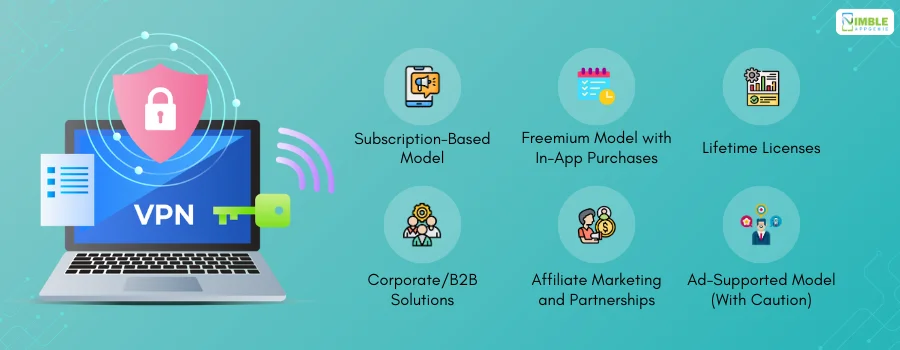
♦ Subscription-Based Model
The subscription-based model is the most common and lucrative way to monetize a VPN app.
Users pay a recurring fee (monthly, quarterly, or annually) to access premium features such as higher connection speeds, access to more servers, and enhanced security options.
Offering different subscription tiers can cater to various user segments, from casual users to businesses requiring advanced features.
- Revenue Potential: High
- Key Considerations: To maximize revenue, it’s essential to provide a free trial or a limited-feature free version to attract users and convert them into paying customers. Offering discounts for long-term subscriptions (annual plans) can also increase customer retention.
♦ Freemium Model with In-App Purchases
In the freemium model, the app is free to download and use with basic features, while advanced features are locked behind a paywall.
Users can purchase these features individually or as part of a premium package. This model works well because it allows users to try the app before committing to a purchase.
- Revenue Potential: Medium to High
- Key Considerations: It’s important to strike a balance between the free and paid features. The free version should be useful enough to attract users, but the premium features should offer significant value to encourage upgrades.
♦ Lifetime Licenses
Offering a one-time payment option for a lifetime license can attract users who prefer not to commit to recurring payments.
While this model generates revenue upfront, it may be less sustainable in the long term compared to subscription-based models.
- Revenue Potential: Medium
- Key Considerations: Lifetime licenses can be combined with subscription models, offering them as a premium option for users who want long-term access without ongoing payments. This model is particularly effective during limited-time promotions.
♦ Corporate/B2B Solutions
Businesses and organizations require secure VPN solutions for their employees, especially in remote work settings.
Offering corporate packages or B2B solutions can be a lucrative revenue stream.
These packages typically include bulk licensing, centralized management tools, and enhanced security features tailored to business needs.
- Revenue Potential: High
- Key Considerations: Corporate solutions often require custom features and dedicated support, which can increase development and operational costs. However, the higher price point for corporate clients can offset these costs.
♦ Affiliate Marketing and Partnerships
Some VPN apps incorporate affiliate marketing by promoting third-party services or products within the app.
In addition to this, partnering with other tech companies or digital services can create cross-promotional opportunities, where users receive discounts or exclusive offers from partnered services.
- Revenue Potential: Medium
- Key Considerations: Affiliate marketing should be approached carefully to avoid compromising the user experience. The partnerships should be relevant to your user base and provide genuine value.
♦ Ad-Supported Model (With Caution)
While displaying ads can generate revenue, it’s generally not recommended for VPN apps due to the potential impact on user experience and privacy concerns.
However, if implemented, the ads should be non-intrusive, and the app should clearly communicate that the user’s privacy is not compromised.
- Revenue Potential: Low to Medium
- Key Considerations: If you choose to implement ads, consider offering an ad-free version as part of a premium subscription to cater to users who prefer an uninterrupted experience.
Revenue Projections and Scalability
The potential revenue from a VPN app depends on various factors, including the number of users, subscription pricing, and the effectiveness of your monetization strategy.
Here’s a basic projection based on a subscription-based model:
| User Base | Monthly Subscription Fee | Annual Revenue Potential |
| 10,000 users | $5 per month | $600,000 |
| 50,000 users | $5 per month | $3,000,000 |
| 100,000 users | $5 per month | $6,000,000 |
These figures illustrate the revenue potential of a VPN app with a moderate user base. As the user base grows and additional monetization models are implemented, the revenue can scale significantly.
A well-executed ROI strategy that combines multiple monetization models can ensure steady revenue growth and long-term sustainability for your VPN app.
Nimble AppGenie, Your Partner in Mobile App Innovation
When it comes to developing a high-quality, secure, and user-friendly VPN app, Nimble AppGenie is your ideal partner.
With years of experience in mobile app development, we specialize in creating custom solutions tailored to meet the specific needs of our clients.
Our team of expert developers, designers, and project managers work closely with you to bring your vision to life, ensuring that every aspect of your app is optimized for success.
Ready to take your VPN app idea to the next level?
Contact Nimble AppGenie today, your trusted mobile app development company, and let’s build something extraordinary together.
Conclusion
Developing a VPN app is a significant investment that can yield substantial returns, especially in today’s privacy-conscious digital landscape. From understanding the factors that affect development costs to selecting the right monetization strategies, careful planning and execution are essential to creating a successful VPN app. The estimated cost to develop a VPN app ranges from $50,000 to $150,000, depending on the app’s complexity, features, and the development team’s location.
FAQs

Niketan Sharma is the CTO of Nimble AppGenie, a prominent website and mobile app development company in the USA that is delivering excellence with a commitment to boosting business growth & maximizing customer satisfaction. He is a highly motivated individual who helps SMEs and startups grow in this dynamic market with the latest technology and innovation.
Table of Contents





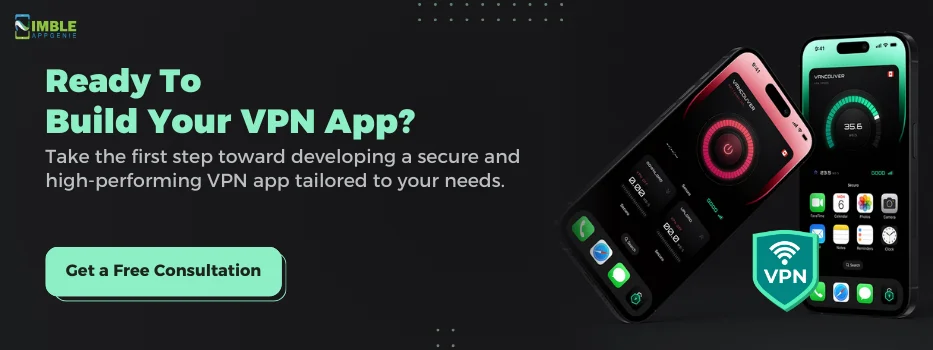
No Comments
Comments are closed.